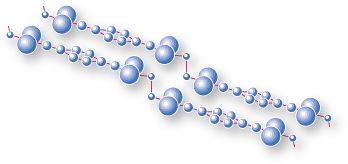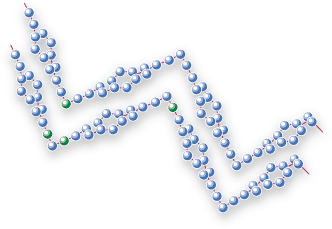PTT fibres
The modification of polyester is an important item in the research of fibers that have new characteristics and new performances. This fiber is the most spread among the chemical fibers and it has reached an high maturity, so it must differentiate, extend the range of its applications, increase its margins.
There was recently a big increase in interest for the Corterra fiber (the mark of the Royal Dutch-Shell Group) and in general for those fibers marked as PTT (polytrimethylene terephthalate).
The fiber is got through polycondensation of PTA (purified terephthalic acid) and PDO (1,3 propanediol), which is chemically obtained by the Shell group and that is biochemically obtained by DuPont.
The PTT fiber is considered to be the most important fiber of the after-polyester period, and they (Shell) think to reach a production of over one million tons, also including those products that are different from fibers. Shell has given its license to produce textile fibers from the polymer to some operators of different geographic areas.
Those operators who can utilize the Corterra mark are:
KoSa
KoSa is one of the world's leading polyester producers, with more than 4,000 customers worldwide. The company manufactures commodity and specialty polyester products as part of five global businesses: Textile Fibers, Intermediates and Polymer, Packaging Resins, Technical Filament and Tire Cord. With headquarters in Houston and regional offices in Charlotte (N.C., USA), Frankfurt (Germany), and Toluca (Mexico), KoSa operates 15 manufacturing sites in North America and Europe and employs more than 10,000 people.
Catalana de Polimers (CdP)
Catalana de Polimers of Spain began deliveries of Corterra fibers to European customers from the first quarter of 2000. The company believes that Corterra PTT will offer European manufacturers many options for superior new products for a broad range of uses in all types of textiles.
Interface Flooring Systems, Inc.
Interface Flooring Systems, Inc., the world's largest supplier of commercial carpets, has chosen yarn made with Shell Chemicals Corterra Polymers to produce its new Solenium woven textile floor covering. This flooring combines the wear and maintenance properties of vinyl with the style, comfort and safety of carpet. Solenium comprises an impermeable polyurethane cushion backing, a bond coat and a fiber layer. The fiber is made from extruded Corterra Polymer.
Setila
Setila SA of France is a high quality specialty yarn producer and has launched Corterra yarns and fabric concepts at Première Vision in Paris in October 1999. Downstream product development partnerships will produce products for the sportswear and casualwear markets.
Unifi Textured Yarns Europe Ltd
The international division of Unifi Inc, one of the world's leading texturing companies, launched Corterra yarns and fabric concepts at Première Vision in Paris in October 1999. Downstream product development partnerships will produce products for innerwear, sportswear, swimwear and casualwear markets.
Miroglio SpA
Filature Miroglio is the yarn division of Miroglio SpA one of Europe's largest integrated yarn to clothing companies. Started in 1981 to cover internal needs, today this division sell outside the Miroglio group more than 80% of total production (25.000 tons per year of polyester filament yarns and polyester plus cellulosic spun yarns). In December 1999, during Expofil, Filature Miroglio launched their Corterra yarns under a new brand concept, called SENS: Soft, Easy-care, New and Stretch. Downstream transformation will produce fabrics for underwear, outerwear and sports wear markets.
SK Chemicals
SK Chemicals, the leader of high quality specialty yarn production in Korea, introduced the first filament yarn made with Corterra (75/24 DTY) to the industry as early as November 1998 and has since successfully launched Corterra yarns under its own commercial brand of Espol. Espol is now being promoted vigorously with the product range of 50/24, 75/24 and 75/72 (and also 100/48, 150/48 and 150/144) flat yarns as well as textured yarns and will find its way to sportswear, casualwear, lingeries and bathing suits.
Hankook Synthetics Inc
Hankook Synthetics Inc. is the largest polyester company in Korea, equipped with the most advanced technology licensed from Lurgi-Zimmer. Hankook has launched Corterra yarns under its commercial brand of Zispan and now foresees its greater future with Corterra given superior characteristics such as color fastness, outstanding softness, dry touch and stretch-recovery.
Hyosung Corporation
Hyosung Corporation is one of the highly integrated fiber companies in Korea and after the long term production trials has introduced Corterra yarns under its commercial brand of Neopol to the various down stream customers. Hyosung is excited about the deep shade, silky touch and excellent stretch-recovery materialised by Corterra. At present focus is concentrated on the arena of Circular Interlock and/or Tricot but the horizon will soon be expanded to woven fabrics as more experiences built up.
Beside these initiatives we must mention that Asahi have announced they have registered over 100 patents to protect the production of the PTT fibers.
The interest for this fiber is so high that the consultation society Condux has started a multiclient research about the perspectives of PTT and PDO. The latter seems to be the decisive component of the process of analyzing costs, investments and selling prices.
DuPont announced (April 2000) the birth of the 3GT fiber, which is commercialized as Sonora. From October this year the production capacity will be of about 27 millions lb (PDO will come from Degussa in Germany), to be widen to 112 millions. The now existing processes to produce PDO, key-component to produce PTT, are those of Shell, DuPont, Degussa.
Lurgi Zimmer PTT was first patented in 1941, but it was not produced until the 1990s, when Shell Chemicals developed the low-cost method of producing high-quality 1,3 propanediol (PDO), the starting raw material for PTT Corterra Polymers.
In mid-1999, Shell Chemicals and Lurgi Zimmer broke ground in Altamira, Mexico for construction of the world's first commercial-scale facility dedicate solely to production of Corterra Polymers.
PTT Fiber Characteristics
PTT is an advanced polymer that can be spun into fibers. The fibers and yarns have a unique combination of properties including stretch and recovery, softness, bulk, and easy dye. Fabrics produced from PTT fibers and yarns clean easily and have superior durability.
PTT unifies the main and best characteristics of nylon and polyester for the most disparate applications, even if today the most characteristic ones concern carpets and car- and house-fittings.
As regards to other synthetic fibers, PTT ones are softer, are easier to be dyed, keep vivid colours longer, lose their shape easier and as easier go back to their original shape. They also are better dirty-resistant, are easier to be cleaned and dry quickly.
If we analyze the macromolecular structure of PTT, we can notice the structural and substantial differences with the fibers of PET.
PET Structure
 |
PTT Structure
 |
|



